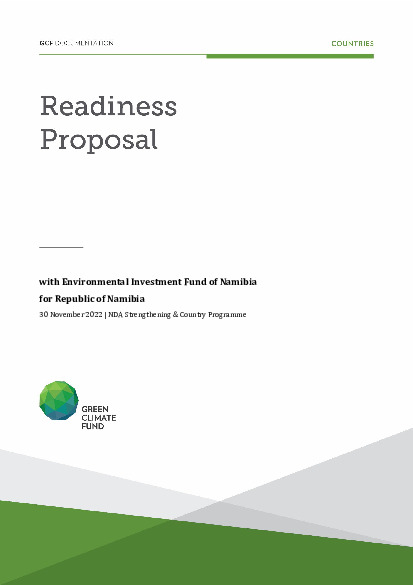Developing key legislation, regulation, policies and concept notes for climate action in Namibia

Developing key legislation, regulation, policies and concept notes for climate action in Namibia
In the absence of adequate human resource with technical capacity, feasibility information, a supportive and aligned policy and regulatory environment, Namibia will not be able to fully implement the NDC and contribute to the global goal of the Paris Agreement. Since Namibia has committed to decrease emissions by 91% by 2030. Green Hydrogen has become a priority for the country to achieve this ambition, strengthen the country with technical competences and technology that will serve as a model for replication to other African countries in the region.
Namibia submitted its updated Nationally Determined Contribution (NDC) to the UNFCCC in July 2021 with an ambitious target of cutting greenhouse gas emissions by 91% by 2030. For this target to be achieved, is the country needs to review and create new policy and legal frameworks for some sector targets related to Green Hydrogen.
Specifically for the energy sector the country needs a detailed National Energy Efficiency Policy to cover all sectors of the economy. This Policy will set specific efficiency goals for various sectors and utilities; and will be able to identify the potential of decoupling power sales from profits, to incentivize energy efficiency.
The proposed National Energy Efficiency Policy will cover the following but not be limited to:
- Policy measures on transitioning from fossil fuels to modern, low-emission, and locally produced alternative energy such as Green Hydrogen
- Policy measures on the use of Biomass and application modalities.
- Policy measures on the use of Thermal Energy and application modalities.
Furthermore, the National Climate Change Policy (NCCP) of 2011, was developed before Namibia prepared the NDC, signed up to the Paris Agreement, and therefore its policy measures do not align with the updated NDC ambitions. As such, the existing policy measures contained in the 2011 National Climate Change Policy do not adequately cover such strategic and long-term interventions as green hydrogen that are needed for the energy sector to contribute to the 91% emission reduction by 2030. This means that the country does not have the necessary policy and legal frameworks required for implementation of actions and attracting private sector investments in the sector. In fact, currently a number of proposed targets in the updated NDC, such as under the sub-sectors of electricity generation and transport (electric vehicles and hydrogen powered vehicles) are not adequately supported by relevant policies and legislation to enable effective implementation of the NDC and achievement of the ambition. Coupled with the above is the inadequate human resource with the relevant complement of technical skills to generate concept notes to mobilize climate finance in the energy sector. As green hydrogen is an emerging field, Namibia does not have adequate feasibility information to guide investment in the sector and this gap will negatively affect private sector engagement and resource mobilization.